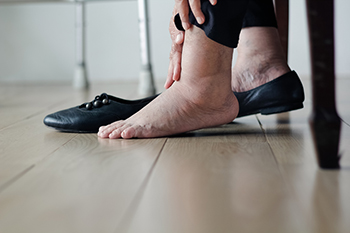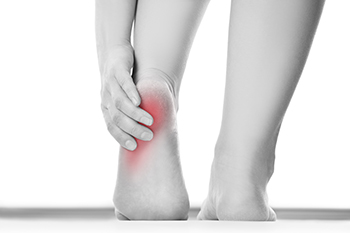April 2023
Some Serious Reasons for Swollen Feet

Swollen feet, also called edema of the feet, can occur from prolonged standing or walking and can be relieved by resting and elevating the legs. However, sometimes, swollen feet can result from a more serious underlying issue. These conditions often affect the movement of fluids within the body. As aging happens, valves within the veins of the legs that keep blood from being pulled down by gravity and pooling in leg veins may function less efficiently and cause swollen feet. Inflammation of the veins causes leg pain, as well as swollen feet. Deep-vein thrombosis is when blood clots form in the deep veins of the legs and block blood from the legs from returning to the heart, which will also cause swollen feet. When one experiences heart failure, the heart is not pumping as it should, and again, blood in the leg veins pools there instead of being pumped back to the heart. Since these and other contributing health conditions can be serious, it is suggested that if your feet are chronically swollen, you see a podiatrist who can diagnose the problem and get treatment underway.
Swollen feet can be a sign of an underlying condition. If you have any concerns, contact the podiatrists of New England Family Foot Care. Our doctors can provide the care you need to keep you pain-free and on your feet.
Swollen feet are a common ailment among pregnant women and people who stand or sit for extended periods. Aging may increase the possibility of swollen feet and patients who are obese often notice when their feet are swelling too. There may be medical reasons why swollen feet occur:
- Phlebitis - A condition that causes the veins to become inflamed and can also cause leg pain.
- Liver disease - This may lead to low blood levels of albumin which is a protein. This can cause fluid in the blood to pass into the tissues and several areas of the body can become swollen.
- Heart failure - When the heart doesn’t pump properly the blood that is normally pumped back to the heart can pool in the veins of the legs causing swollen feet.
- Kidney disease - One of the main functions of the kidneys is releasing excess fluid in the body. This type of condition can make it difficult for the kidneys to function properly, and as a result the feet may become swollen.
- Deep-vein thrombosis (DVT)- This is a serious condition where blood clots form in the veins of the legs. They can block the return of blood from the legs to the heart which may cause the feet to swell. It is important to be treated by a podiatrist if this condition is present.
Swollen feet can also be caused by bone and tendon conditions, including fractures, arthritis, and tendinitis. Additionally, there may be skin and toenail conditions and an infection may cause the feet to swell. Patients who take medicine to treat high blood pressure may be prone to getting swollen feet.
Many patients elevate their feet to help relieve the swelling and this is generally a temporary remedy. When a podiatrist is consulted the reason behind the swelling can be uncovered and subsequently treated.
If you have any questions please feel free to contact our office located in Milton, MA . We offer the newest diagnostic tools and technology to treat your foot and ankle needs.
Plantar Fasciitis Can Be Caused by Playing Pickleball

Pickleball has become a popular sport in recent years. It is a mix between tennis, badminton, and ping pong. While it is exciting to experience the thrill of victory, it may come with having foot pain. The game is played by pushing off on the ball of the foot, and this may cause the plantar fascia to undergo stress. When played frequently, it may lead to plantar fasciitis, which is the inflammation and irritation of the plantar fascia. This is the band of tissue that connects the heels to the toes, and provides the ability to walk and run. Effective stretches for the plantar fascia can begin with rolling the affected foot on a tennis ball or frozen water bottle. This can help to strengthen the arch of the foot. Some people find it helpful to wear custom-made orthotics, in addition to choosing shoes that fit correctly. If you are interested in playing pickleball, it is suggested that you confer with a podiatrist who can guide you toward techniques that can protect the plantar fascia.
Foot Pain
Foot pain can be extremely painful and debilitating. If you have a foot pain, consult with the podiatrists from New England Family Foot Care. Our doctors will assess your condition and provide you with quality foot and ankle treatment.
Causes
Foot pain is a very broad condition that could be caused by one or more ailments. The most common include:
- Bunions
- Hammertoes
- Plantar Fasciitis
- Bone Spurs
- Corns
- Tarsal Tunnel Syndrome
- Ingrown Toenails
- Arthritis (such as Gout, Rheumatoid, and Osteoarthritis)
- Flat Feet
- Injury (from stress fractures, broken toe, foot, ankle, Achilles tendon ruptures, and sprains)
- And more
Diagnosis
To figure out the cause of foot pain, podiatrists utilize several different methods. This can range from simple visual inspections and sensation tests to X-rays and MRI scans. Prior medical history, family medical history, and any recent physical traumatic events will all be taken into consideration for a proper diagnosis.
Treatment
Treatment depends upon the cause of the foot pain. Whether it is resting, staying off the foot, or having surgery; podiatrists have a number of treatment options available for foot pain.
If you have any questions, please feel free to contact our office located in Milton, MA . We offer the newest diagnostic and treatment technologies for all your foot care needs.
Causes of Heel Pain When Walking

Experiencing heel pain while walking is a common complaint. The three most common causes of heel pain are plantar fasciitis, bursitis, and Achilles tendonitis. Plantar fasciitis is when the plantar fascia, the band of connective tissue running on the sole from the heels to the toes, becomes inflamed or sustains micro tears. This band supports the arch of the foot and absorbs shock when running, jumping, and walking. Bursitis is the swelling and inflammation of the bursa, which are fluid-filled sacs that cushion the heel bone. Achilles tendonitis involves irritation and inflammation of the tendon that runs from the calf muscle to the heel bone. All three conditions may result from overuse or wearing shoes that do not fit properly. For these and other causes of heel pain, it is suggested that you visit a podiatrist for a proper diagnosis and treatment plan.
Many people suffer from bouts of heel pain. For more information, contact the podiatrists of New England Family Foot Care. Our doctors can provide the care you need to keep you pain-free and on your feet.
Causes of Heel Pain
Heel pain is often associated with plantar fasciitis. The plantar fascia is a band of tissues that extends along the bottom of the foot. A rip or tear in this ligament can cause inflammation of the tissue.
Achilles tendonitis is another cause of heel pain. Inflammation of the Achilles tendon will cause pain from fractures and muscle tearing. Lack of flexibility is also another symptom.
Heel spurs are another cause of pain. When the tissues of the plantar fascia undergo a great deal of stress, it can lead to ligament separation from the heel bone, causing heel spurs.
Why Might Heel Pain Occur?
- Wearing ill-fitting shoes
- Wearing non-supportive shoes
- Weight change
- Excessive running
Treatments
Heel pain should be treated as soon as possible for immediate results. Keeping your feet in a stress-free environment will help. If you suffer from Achilles tendonitis or plantar fasciitis, applying ice will reduce the swelling. Stretching before an exercise like running will help the muscles. Using all these tips will help make heel pain a condition of the past.
If you have any questions please contact our office located in Milton, MA . We offer the newest diagnostic and treatment technologies for all your foot and ankle needs.
Do Your Child's Feet Hurt?
Flat Foot Diagnosis

People who are lacking an arch in their feet are known to have flat feet. All babies are born with flat feet, and the arch generally develops in the teenage years, but this may not happen in some adults, possibly due to genetic factors or if they have endured a foot injury. Additionally, there may be existing Achilles tendon conditions or muscle problems that may lead to having flat feet. This ailment is easily diagnosed by undergoing a physical examination in addition to having an X-ray performed. It is beneficial for patients with flat feet to wear supportive shoes and refrain from wearing shoes that lack arch support, such as flip-flops. Adults who have flat feet may need additional support, and this may include wearing custom-made orthotics. If you are experiencing aches and pains from having flat feet, it is suggested that you confer with a podiatrist who can help you with relief techniques.
Flatfoot is a condition many people suffer from. If you have flat feet, contact the podiatrists from New England Family Foot Care. Our doctors will treat your foot and ankle needs.
What Are Flat Feet?
Flatfoot is a condition in which the arch of the foot is depressed and the sole of the foot is almost completely in contact with the ground. About 20-30% of the population generally has flat feet because their arches never formed during growth.
Conditions & Problems:
Having flat feet makes it difficult to run or walk because of the stress placed on the ankles.
Alignment – The general alignment of your legs can be disrupted, because the ankles move inward which can cause major discomfort.
Knees – If you have complications with your knees, flat feet can be a contributor to arthritis in that area.
Symptoms
- Pain around the heel or arch area
- Trouble standing on the tip toe
- Swelling around the inside of the ankle
- Flat look to one or both feet
- Having your shoes feel uneven when worn
Treatment
If you are experiencing pain and stress on the foot you may weaken the posterior tibial tendon, which runs around the inside of the ankle.
If you have any questions please feel free to contact our office located in Milton, MA . We offer the newest diagnostic and treatment technologies for all your foot and ankle needs.





